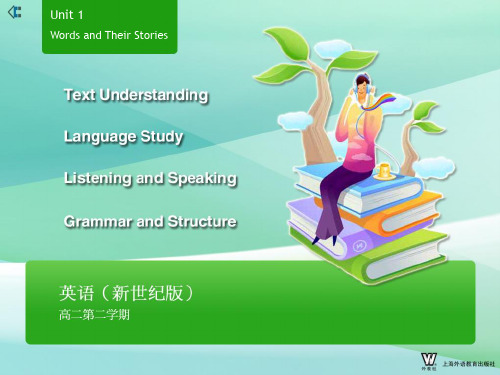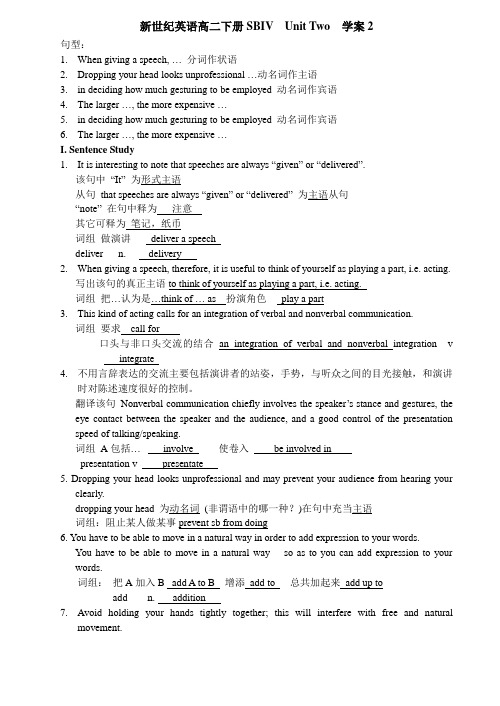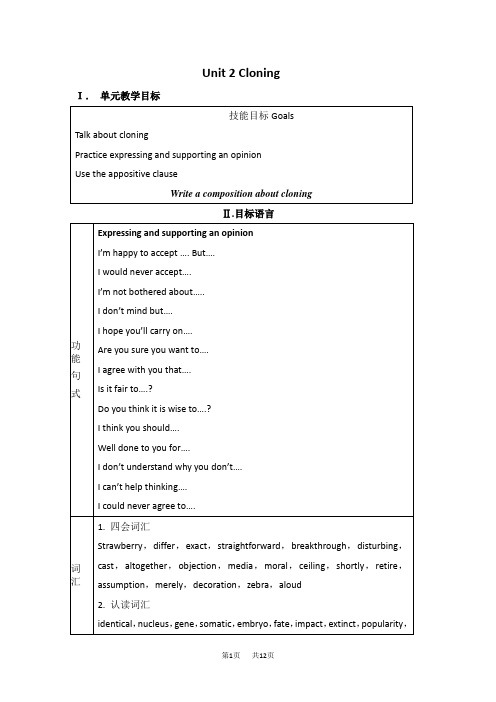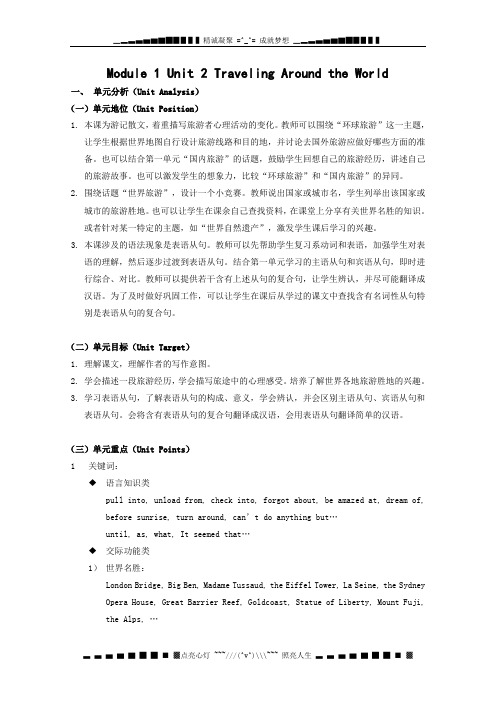新世纪英语高二第二学期Unit2电子备课完整版
- 格式:ppt
- 大小:3.40 MB
- 文档页数:110


新世纪英语高二下册SBIV Unit Two 学案2句型:1.When giving a speech, …分词作状语2.Dropping your head looks unprofessional …动名词作主语3.in deciding how much gesturing to be employed 动名词作宾语4.The larger …, the more expensive …5.in deciding how much gesturing to be employed 动名词作宾语6.The larger …, the more expensive …I. Sentence Study1.It is interesting to note that speeches are always “given” or “delivered”.该句中“It”为形式主语从句that speeches are always “given” or “delivered”为主语从句“note”在句中释为___注意__其它可释为笔记,纸币词组做演讲____deliver a speech__deliver n. ____delivery___2.When giving a speech, therefore, it is useful to think of yourself as playing a part, i.e. acting.写出该句的真正主语to think of yourself as playing a part, i.e. acting.词组把…认为是…think of … as 扮演角色play a part3.This kind of acting calls for an integration of verbal and nonverbal communication.词组要求__call for____口头与非口头交流的结合an integration of verbal and nonverbal integration v ____integrate_4.不用言辞表达的交流主要包括演讲者的站姿,手势,与听众之间的目光接触,和演讲时对陈述速度很好的控制。

新高二英语Unit2教案_高一英语教案_模板内容预览:Period 1Teaching Steps:Step1. Revision1. Have a dictation in class.2. Read the new words in the period.media, reliable, fire, face, difficulty, nosy, Gray, editor, reason, ele……你还没注册?或者没有登录?这篇文章要求至少是本站的注册用户才能阅读!如果你还没注册,请赶紧点此注册吧!如果你已经注册但还没登录,请赶紧点此登录吧!教学目标Teaching aims and demands本单元的教学目标是使用学生能向他人提出建议和忠告,学生并掌握过去完成时态的有关用法。
要求学生初步了解一些有关美国乡村音乐的基本描述,能够描述一两个他们所喜爱的美国乡村歌手。
Teaching important and different points1.单词、词组value, remain, anger, equipment, however, appear, make fun of, think of, so far, once more, no longer2.日常交际用语Haven’t you heard of…?That’s a good idea!You’d better…I think you’d enjoy it.Why not…?Why don’t you…?3.语法教学建议对话建议:建议教师在上课时在导入课时给学生放一些相关的音乐欣赏,在听读练习时可放入多媒体形式,利用对话中的日常生活用语,谈论学生所熟悉的歌星、影星和球星,for example: haven’t you heard of….. 最后朗读并编演对话。
课文分析:本篇课文主要介绍了美国乡村音乐在不同时期、年代人们的思想观念的不同及追求人生的目标,用歌曲就能体现出来,如:1990s、1950s、1960s. 而现在的美国乡村音乐从它的主题思想、范围、歌手及使用的乐器都所不同。

Unit 2 Cloning I.单元教学目标Ⅱ.目标语言III. 教材分析与教材重组1. 教材分析本单元以Cloning为话题,旨在通过单元教学,使学生了解克隆技术的优缺点,学会表达和支持个人观点,能用所学的有关Cloning的词汇去表述自己对这一新技术的观点和看法。
1.1 Warming Up 提供了四幅有关Dolly the sheep(多莉羊) A strawberry plant(草莓植物) Twins(双胞胎婴儿)Identical dogs(克隆狗)的图片,让学生用已有的知识和经验讨论对克隆技术的看法与观点。
1.2 Listening是关于人类克隆的听力材料,难度中等。
1.3 Speaking 根据材料,四人小组合作,要求把自己对克隆婴儿的态度和感觉用相关的语言表达出来。
语言要得体,锻炼语段表达能力。
1.4 Pre-reading是Reading的热身活动。
它要求采用与同学讨论交流的方式谈论有关克隆的相关知识。
1.5 Reading是一篇介绍克隆技术的说明文。
1.6 Comprehending第一题所给出的表格让学生根据课文内容列举克隆技术的优缺点。
第二题让学生根据所拥有的知识来评价作者的观点。
第三题要求学生用自己的语言阐述对克隆技术的观点并给出理由。
1.7 Learning about Language 分词汇和语法两部分,其中Discovering useful words and expressions 是根据语境在运用中掌握词汇。
Discovering useful structures 是通过阅读和补全句子来练习。
1.8 Using Language中的Reading,Discussing and writing要求学生先读, 然后完成四个任务型的作业。
即 1. 讨论并回答三个问题。
回答这些问题,2. 讨论几种已经灭绝的动物,并且讨论哪种动物应该被恢复到这个世界上,并且给出理由。


Module 1 Unit 2 Traveling Around the World一、单元分析(Unit Analysis)(一)单元地位(Unit Position)1. 本课为游记散文,着重描写旅游者心理活动的变化。
教师可以围绕“环球旅游”这一主题,让学生根据世界地图自行设计旅游线路和目的地,并讨论去国外旅游应做好哪些方面的准备。
也可以结合第一单元“国内旅游”的话题,鼓励学生回想自己的旅游经历,讲述自己的旅游故事。
也可以激发学生的想象力,比较“环球旅游”和“国内旅游”的异同。
2. 围绕话题“世界旅游”,设计一个小竞赛。
教师说出国家或城市名,学生列举出该国家或城市的旅游胜地。
也可以让学生在课余自己查找资料,在课堂上分享有关世界名胜的知识。
或者针对某一特定的主题,如“世界自然遗产”,激发学生课后学习的兴趣。
3. 本课涉及的语法现象是表语从句。
教师可以先帮助学生复习系动词和表语,加强学生对表语的理解,然后逐步过渡到表语从句。
结合第一单元学习的主语从句和宾语从句,即时进行综合、对比。
教师可以提供若干含有上述从句的复合句,让学生辨认,并尽可能翻译成汉语。
为了及时做好巩固工作,可以让学生在课后从学过的课文中查找含有名词性从句特别是表语从句的复合句。
(二)单元目标(Unit Target)1. 理解课文,理解作者的写作意图。
2. 学会描述一段旅游经历,学会描写旅途中的心理感受。
培养了解世界各地旅游胜地的兴趣。
3. 学习表语从句,了解表语从句的构成、意义,学会辨认,并会区别主语从句、宾语从句和表语从句。
会将含有表语从句的复合句翻译成汉语,会用表语从句翻译简单的汉语。
(三)单元重点(Unit Points)1关键词:◆语言知识类pull into, unload from, check into, forgot about, be amazed at, dream of,before sunrise, turn around, can’t do anything but…until, as, what, It seemed that…◆交际功能类1)世界名胜:London Bridge, Big Ben, Madame Tussaud, the Eiffel Tower, La Seine, the Sydney Opera House, Great Barrier Reef, Goldcoast, Statue of Liberty, Mount Fuji,the Alps, …2)与“环球旅游”相关的词或短语:destinations, airports, hotels, transportations, visa, currency, customs, weather, maps, souvenirs, passport, cultural shock, travel agency, …2 功能:1)Describing the scene(描述风景)参考课本第34页 Useful Language2) Planning a trip abroad●Destination●Time●Transportation●Passport●Accommodation●Equipment●Expectation / Aim●Cultural study3 语法点:学习表语从句。
Unit 2 Growing Up一、单元分析( Unit Analysis)(一) 单元地位〔Unit Position〕本单元的课文首先通过人生在成长过程中的得与失,向学生展示了一个真实的人生面貌,从而让学生明白,人生是一个矛盾综合体,因此我们应该懂得什么时候该把握住,什么时候该放弃。
而解决这个问题的办法就是追求更加广阔的视野,弃小我,成就大我,不过多地追求物质财富,应该追求智慧和精神财富,才能使自己的人生变得更加有意义。
围绕这个主题,教师可以设计活动组织学生讨论,了解成长过程中我们会得到什么与失去什么,理解生活的真谛和成长的过程。
从而使他们,并在即将步入社会之际,对自己将要成为一个什么样的人有一个明确的认识,从而树立起正确的人生观和人生目标。
在学习课文的同时,教师应创造机会让学生对一些社会人物的人生和一些行为进行评价,教师提供一些典X人物作为学生的榜样,从而培养他们的是非观念和对人生的积极地思考,对人生的意义有一个更加正确的理解。
在此基础上,让学生描述“ 我想成为一个什么样的人〞。
本单元的语法主要是复习不定式,使学生对不定式有一个全面的了解,在掌握不定式的形式和不定式的功能的同时,教师应该提供更多的机会让学生运用。
Additional Reading 是一那么非常贴近学生生活的成长故事。
应该让学生学会欣赏文章的语言,学习对故事的表达。
鼓励让学生集体活动,互相分享自己的成长故事和经历,(二) 单元目标(Unit Target)1. 理解人生的真谛,树立正确的人生目标。
2.全面掌握动词不定式的用法,并能在实际中正确熟练地运用。
3.练习阅读技巧,并学习欣赏散文式的文章。
4. 能对一些社会人物和现象进行评价,学习友善地表达自己的反对意见;能比较流畅的表达自己的故事和经历。
(三) 单元重点(Unit Points)1 关键词:◆语言知识类Experience, shelter, decline, fashion, puzzle, deed, endure, dim, attempt, apologize, guilt, confess,Let go, hold fast to, marvel at, a progression of, be bound to, live on, add to, be lighted with, tear from, a pile of, invest sth. with, ,waste time doing ,of enduring worth, in the process, go beyond. On condition that, lose track of time , reflect on, show up◆交际功能类1、对人生的描绘性词:beauty, goodness, truth, love, fairness, justice, imperfection, gloriouscolors of hope, wisdom, meaning, golden sunshine, golden minute, the art of living, a timeless pattern2、表达不同建议的表达方式:Look at the facts.It seems an exaggeration, to say the least.I don’t deny that ….but …..Oh, I just can’t accept that ….Perhaps you’d let me finish.Aren’t you going a bit too far when you say that…2. 功能1〕It teaches us to hold fast to its many gifts while it also orders us to give them up.Don’t waste your lives accumulating objects.Pray not for the material but for wisdom.Put them all together, go beyond their present imperfections, and you have a future lighted with the glorious colours of hope.2) 用不定式进行描述3〕记叙文的写作技巧二、教学设计(Teaching Designs)[1]Step 1. 让学生讨论:What is life?让学生用Life is ….造句。
新世纪⼤学英语综合教程第⼆册讲解Unit2第⼀讲Unit 2 Learning a Language(Listen and Talk)(讲义)⼀、教学⽬的1. Know the definition of a language.2. Understand the importance of learning a foreign language.3. Master the ways of learning a foreign language.⼆、教学时数 2学时三、教学⽅法: Discussion四、教学重点:To talk and discuss about why should a foreign language.五、教学难点: Learn a suitable and effective way to learn a foreign language.六、教学内容(详细具体)Step I Lead-in:1) What is language?Language is a system of symbols designed for the purpose of human communication2) What is the function of language?Direction: Rearrange the words and phrases into a logical order.The tongue is not made of steel, yet it cuts. ⾆头不是钢,⼀动把⼈伤。
A good tongue is a good weapon.⼝齿伶俐,是件利器。
A foreign language is a weapon in the struggle of life.外语是⼈⽣⽃争的武器。
Step II Listen: Why should we learn English: Dialogue1: Listen to the dialogue once and answer the questions.1. How important is English in Yi Ling’s opinion?English gives her more access to knowledge and job opportunities.2. What type of career is Yi Ling thinking of?To be a businessman, an engineer, or a scientist.Direction: Listen to the dialogue again and check your understanding.ScriptJohn: Do you think English is very important to you, Yi Ling?Yi Ling: Definitely!John: In what way?Yi Ling: The biggest thing is that it gives me more access to knowledge. So many materials and resources are in English these days.John: Tell me more about it?Yi Ling: With English we can use more computer software, get more information onthe Internet, enjoy foreign movies and TV shows. You see, it makes a big difference. John: What about job opportunities? Can you get a better career if you are good at English here in China?Yi Ling: Definitely. And a better career means a better salary.John: What type of career are you thinking of?Yi Ling: I’m not sure yet. Maybe a businessman, maybe an engineer, or who knows? Maybe even a scientist.John: Wow, you have high aspiration(ambition)!Why should we learn English?Think of at least 3 reasons why we should learn English in groups.to learn about some western culture to use for business to talk to native speakers to serve in the Olympics to use in tourism to read English books and surf the internet to listen to English music and movies SummaryWith the development of globalization(全球化), English has become an international tool for people to communicate with each other. And we are the future of our homeland, so it’s our duty to prosper(繁荣)our country; therefore, to master a foreign language becomes a necessity (= It is necessary to master a foreign language).Share your experience or effective ways of studying EnglishTips:+ keen interest+ confidence+ aggressiveness in study+ strong motive to communicate and express self-feeling+ participation in class-teaching+ trial and error procedure+ unique style of self-studyReferences:1. Cultivate learning interests and practice. (Tell me,I will know it;Teach me,I will understand it;Involve me,I will remember it.)2. Make you obtain certain language points and rejoice in your achievements.3. Have good learning strategies and develop your learning efficiency.StepV Homework: Preview Text B and recite the new words in Text B.Presentation: How to live a healthy life?Step III Listen: Peoples’ experiences of learning a foreign language.1) listen and find out various Language Learning Stylesa. You may be surprised to find that there are different ways of going aboutlearning languages, none of which is necessarily better than the others.b. Researchers have identified four basic learner “types”…c. It’s unusual for a person to be exclusively one “type” rather than another.d. Most of us are mixtures of styles.2) Focus on the four basic learner “types.” Match Column A, the learner types, with Column B, ways of learning languages.Communicative learners : Watching & listening to native speakers and having conversations.Analytical learners : Studying grammar and finding their own mistakes. Authority-oriented learners : Having teachers explain everything and writing everything down in the notebook.Concrete learners: Playing games, looking at pictures and talking in pairs, etc. ScriptAll right, class. Today we're going to be looking at different language learning styles. You may be surprised to find that there are different ways of going about learning languages, none of which is necessarily better than the others. Researchers have identified four basic learner "types" -- the communicative learner, the analytical learner, the authority-oriented learner and the concrete learner. Communicative learners like to learn by watching and listening to native speakers. At home, they 'like to learn by watching TV and videos. They like to learn new words by hearing them. In class, they like to learn by having conversations. Now, concrete learners like to learn by playing games, by looking at pictures and videos in class, by talking in pairs, and by listening to cassettes at home and school. Now, authority-oriented learners, on the other hand, like the teacher to explain everything. They like to write everything down in their notebook, and they like to have a textbook. They like to learn new words by seeing them. And finally, we have analytical learners. These learners like to learn by studying grammar. At home, they like to learn by studying English books, and they like to study by themselves. They like to find their own mistakes. Now, of course, it's unusual for a person to be exclusively one "type" rather than another. Most of us are mixtures of styles. What type of learner do you think you are?Step IV Discussion: What are the effective ways of learning a foreign language. Tips:+ keen interest+ confidence+ aggressiveness in study+ strong motive to communicate and express self-feeling+ participation in class-teaching+ trial and error procedure+ unique style of self-studyReferences:1. Cultivate learning interests and practice. (Tell me,I will know it;Teach me,I will understand it;Involve me,I will remember it.)2. Make you obtain certain language points and rejoice in your achievements.3. Have good learning strategies and develop your learning efficiency.Step V homeworkPreview Text A and recite the new words in Text A.Presentation: What are the appropriate ways for you to learn a foreign language?七、教学反思Will Chinese become a lingua franca in the near future?第⼆讲Unit 2 Learning a Language(Read: Text AA Language Teacher’s Personal Opinion)(讲义)⼀、教学⽬的1. Learn some words.2. Understand the difficult sentences.3. Learn to give suggestions of learning a foreign language.⼆、教学时数 2学时三、教学⽅法: Discussion四、教学重点:Learn the new words and expressions.五、教学难点: The difficult sentences of Text A.六、教学内容(详细具体)Step I. Revision: dictate the new words of Text A.Step II. Skim the text and choose the best heading for each paragraph.1) Text A has six paragraphs (1-6). Choose the most suitable heading for each paragraph from the list of headings below. List of headingsA. A good method that suits all students does not existB.The behaviorist approachC.Two false attitudes toward English learningD.The role of fellow studentsE.Advertisements often give the false impressionF.The role of interestKey:1-E 2-A 3-C 4-B 5-F 6-D2) Text organizationPart Ⅰ(para.1-2 )-----Discussion on the false impression that learning English is easyand does not need much effort.Part Ⅱ (para.3)-----The two extremes concerning the belief of language learning. Part Ⅲ(para.4) -----The uselessness of teaching method based on the behaviorist theory.Part Ⅳ (para.5-6)-----The useful way of learning a language.Step III. Scan the text and detect the detail information of the text.1) Part ITrue or False1. In order to catch the attention of potential learners, advertisements usually exaggerate the fast pace and great ease of learning English. T2. To be able to read the original works by great writers can be a motivation for people to learn the language of those great writers. T3. People don’t believe what advertisements say about language learning at all. F4. Each individual teacher may have his or her unique way of teaching a language. T Sentence rearrangement1. No doubt this is true to a certain extent, but it is not very helpful to students.2. But it is difficult for anyone to explain in simple language why one method is better than another, and it is no use pretending that anyone has discovered a perfect way of teaching English in every possible situation.3. It is natural for students to be attracted to methods that will teach them as quickly and efficiently and cheaply as possible.4. Some experts even argue that there are as many good methods of teaching a language as there are good teachers, because every teacher is an individual with his own personality.Key: 3-2-4-1Questions and answerQ 1 What do advertisements for English learning always claim?It is easy to learn English; it doesn’t take much time; it doesn’t take much effort.Q 2 Why do those advertisements also refer to famous writers like William Shakespeare or Charles Dickens?Both they were great writers and are considered ad great masters of the English language. The advertisers intend to use the two British writers to encourage students to join them in learning English so that they will be able to enjoy works by these great writers in the original.Q 3 Wh at is the writer’s response to such advertisements?It’s impossible to learn English well in a short time; many people must believe these ads.SkimmingQ 4 Does the author feel satisfied with the fact that every teacher has his or her own way of teaching English?No. The author recognizes the fact but does not feel happy about it because he thinks simply pointing out the fact does not help students much.If it were as easy to learn English as they say, I would have to look for another job, because very few qualified teachers would be needed.Q 5 What is the author’s profession?He must be an English teacher whose job is to train qualified English teachers.Q 6 What is meant by “every teacher is an individual with his own personality”?It means that different teachers have different personalities and, therefore, a teacher may have his or her own way of teaching English.Q 7 If you all feel that your teacher’s way of teaching is good and acceptable, does it mean that everyone in your class can learn English well enough?No. The reason is simple. Each student is an individual with his or her own personality. That is why the teach should attend to / satisfy / meet the individual needs of his or her students.No doubt this is true to a certain extent, but it is not very helpful to students.Q 8 What can we learn from the expression “This is true to a certain extent, but …”? We can see the author doesn’t totally agree with the previous statement.Q 9 Then, what, in the author’s opinion, is helpful to students?Students should have some good methods in learning English.2) Part IITrue or falseThe only way to learn a language well is to go and live in a country where it is spoken. FQuestions and answerQ 1 What are the two extremes concerning the beliefs of language learning?On one hand, some believe that the only way to learn a foreign language is to spend a great deal of time in the target country; on the other hand, some learners claim that they can master a foreign language just by self-study with only the help ofdictionaries.Q 2 Could you give some examples to show that “it is wrong to assume that each word in English has a precise equivalent in another language and vice versa”?One example is that the English word “aunt”may refer to 姑母,姨母,舅母,婶母,伯母,etc. Another case in point is that in Chinese we have “mantou”(馒头)which has no precise equivalent in English, though we can paraphrase it as “steamed bread”.3) Part IIITrue or falseLearning a language is just like how a parrot imitates a human being. FQuestions and answerWhat would teachers who believe in behaviorist psychology encourage students to do in the language learning context? Behaviorists believe that language learning is a kind of habit formation and they assume that people learn things very much like parrots and chimpanzees. So teacherswho believe in behaviorist psychology would ask students to repeat phrases and do mechanical exercises by imitation.4) (Part IV)Questions and answerQ 1 What is the author’s opinion about lea rning a new language?The author believes that no one can learn a new language well enough unless he or she is interested in it. He also thinks that the way of learning to speak and write in another language is probably similar to the way of learning one’s mother tongue.Q 2 What does the writer emphasize towards the end of this essay?He emphasizes the importance of group work in learning a new language.Q 3 Why does the writer repeat the word “real” in the last sentence?He wants to emphasize the idea th at language learning should be based on “real situations” in “real life” and the language we learn should be “real language”.5)Summary of the textDirection: Complete the following passage with words chosen from this unit. The initial letter of each is given. (Page 28) Step IV. Learn some new wordsGood Usage(Para. 1)according to these advertisementswith very little effort on the student’s parta reference to William Shakespeare or Charles DickensI don’t know whether to laugh or cryridiculous claimsor else(Para. 2)as quickly and efficiently and cheaply as possiblein simple languageit is no use pretendingin every possible situationthere are as many good methods of teaching a language as there are good teachersan individual with his own personalityno doubt (that)to a certain extent(Para. 3)have a great advantage over othersafford to dogo to the opposite extremeit is wrong to assume that .a precise equivalentvice versaprovide students with .let alone(Para. 4)is based onare fond of making students repeat phrasesif we were parrotsit is a pity(Para. 5)in my personal opinionunless he is interested in itrelate them to their own livesIt is worth remembering that languageis a means of communication.is very similar to(Para. 6)another relevant point worth mentioningwe need other people to talk to and listen to when …Key Words and Expressions for Text Apersonal a.[no comp.] concerning, belonging to, or for the use of a particular person; private [⽆⽐较级]个⼈的;私⼈的e.g. 1. Please do not take what I said too seriously; it was just my personal opinion.2. I don’t want to have a hand in his personal affairs.我不愿意过问他个⼈的事。